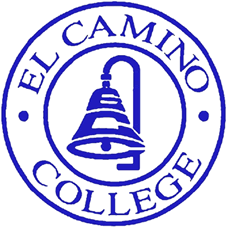
Staff Resources: 1. History of El Camino College
STAFF RESOURCES
1. History of El Camino College
History of El Camino College
What's in a Name?
El Camino is Spanish for "The Road." The road refers to California's first road: "El Camino Real," which means "The King's Road," or "The Royal Road."
Fray Junipero Serra (1713-1784), a Spanish Franciscan priest, explorer and colonizer of California, founded the missions of California along this dirt road. In his 15 years as padre president, he established nine of his 21 missions, each a one-day walk apart (about 30 miles), and all linked by the "El Camino Real." The road stretches from the Mexican border to north of San Francisco.
Why the Bell Logo?
El Camino Real was distinguished by numerous markers of a single bell suspended on an upside down hook-shaped pole. All of them are tributes to California's first road.
From the Beginning...
In 1946, after strong recommendations by a consulting team to establish a two-year college in the Inglewood/South Bay area, the governing boards of the Centinela Valley, Redondo (later to become the South Bay district), Inglewood and El Segundo districts won 10-1 voter approval for the creation of a junior college.
Torrance soon joined the newly chartered group, and the El Camino Community College
District was officially established as of July 1, 1947.
Located centrally in the South Bay, the El Camino Community College District encompasses
five unified and high school districts, 12 elementary school districts and nine cities,
a population of almost one million.
The El Camino Community College District includes the cities of El Segundo, Manhattan Beach, Hermosa Beach, Redondo Beach, Torrance, Lawndale, Hawthorne, Lennox and Inglewood.
The history of El Camino College is told in its buildings which not only show sound pay-as-you-go fiscal policies but which are solid evidence of enrollment growth.
The founders of the college were able to buy the original 80 acres forming the eastern
part of Alondra Park for $1,000 per acre with the money to be spent on athletic facilities
rather than paid to the Los Angeles County Board of Supervisors under whose auspices
it lay. That land was estimated to be worth $225,000 when the transaction was approved
on May 23, 1947. And the remarkable fact is that it had been acquired for nothing
more than the promise to build facilities which would have been built anyway.
Early classrooms were surplus World War II barracks which were trucked north from
the old Santa Ana Army Air Base in Orange County.
At the end of the first 20 years, the property was valued in excess of $5 million.
By today's land prices, best estimates put the value of El Camino College's campus
at more than twice that amount, excluding the buildings.
The first permanent building for classroom instruction was the shop which opened in 1949. The women's gym, field house, another shop building and the social science building came shortly thereafter. Major construction was the order of business nearly every year during the growth years of the college.
El Camino College's buildings cover 1,129,112 square feet and were built at a cost of $28 million. That means 37 structures were completed without any bonded indebtedness to the District.
Working in these buildings is a faculty which has grown since the first 30 members to more than 800 full-time and part-time instructors today. Nearly 20 percent of the full-time faculty have earned doctoral degrees while more than 85 percent have master's degrees. The remainder have excellent credentials in their areas of expertise.
The college is governed by the five members of the El Camino Community College District Board of Trustees. Each is elected for a four-year term by voters in the five trustee areas which make up the college district. Board meetings are monthly and are open to the public.
Heading the administration is the college's president, who also serves as superintendent of the El Camino Community College District. The president is assisted directly by five vice presidents of the college. Their areas of responsibility are Academic Affairs, Administrative Services, Human Resources, Student & Community Advancement, and El Camino College Compton Center.
"The Road to Success"
As the college mushroomed from an enrollment of fewer than 500 in 1946 to more than
27,000 students today, the curriculum expanded to include not only lower division
courses but an honors program and numerous vocational programs. Today, El Camino College
students enjoy a broad curriculum featuring nearly 2,500 different classes offered
in some 850 different programs. With more courses available during a variety of class
times, including online and telecourses, students have wide flexibility in individual
scheduling.
The college confers the associate degree each spring on some 1,200 students who have
completed their 60 semester units and who have satisfied their major field of study
obligations. Many students each year also qualify for certificates of completion,
signifying course requirements have been met in major skill areas.
The college is a reflection of its five presidents. Forrest G. Murdock, the founding
president, served until his retirement in 1958. He was succeeded by Dr. Stuart E.
Marsee, whose tenure saw 24 years of building and growth. Retiring in 1982, he turned
the campus over to Dr. Rafael Cortada. Dr. Cortada's legacy to the college was the
establishment of the El Camino Community College Foundation which raises funds for
programs not supported through the general budget. Dr. Sam Schauerman, who had served
the college first as a dean of instruction, then as vice president of instruction,
became El Camino College's fourth president in 1987. He retired in 1995.
The fifth president was Thomas M. Fallo, who took office July 1, 1995. He had been
vice president of administrative services.
Dr. Dena Maloney serves as El Camino's sixth President from 2016 to 2021. During her five years, she modernized many business practices and worked to develop the technology infrastructure for the school.
Dr. Brenda Thames joined El Camino during the Pandemic as the seventh President of the college. Dr. Thames comes to El Camino from West Hills College Coalinga.
Space Shuttle Endeavor Flies Over El Camino College
This video was recorded by El Camino faculty on October 16, 2012.
Space Shuttle Endeavour Arrival from Andy Wolski on Vimeo.
Mission Statement / Statement of Values
Mission Statement
El Camino College offers quality, comprehensive educational programs and services to ensure the educational success of students from our diverse community.
Statement of Values
Our highest value is placed on our students and their educational goals, interwoven in that value is our recognition that the faculty and staff of El Camino College are the College's stability, its source of strength and its driving force. With this in mind, our five core values are:
People – We strive to balance the needs of our students, employees and community.
Respect – We work in a spirit of cooperation and collaboration.
Integrity – We act ethically and honestly toward our students, colleagues and community.
Diversity – We recognize and appreciate our similarities and differences.
Excellence – We aspire to deliver quality and excellence in all we do.
Source: El Camino College - About - Mission Statement
Board Policies
Policies of the Board of Trustees are available here: El Camino College - Board of Trustees
Next >
